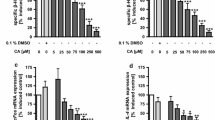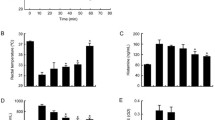Abstract.
Objective: To find novel inhibitors of mast cell function we have studied the effect of a potent, non-antimicrobial, chemically modified tetracycline, CMT-3 or COL-3, on key functions of mast cells.
Methods and Results: In the presence of 25 μM CMT-3, the 48/80-induced histamine release from rat serosal mast cells was inhibited significantly, to 43.0 ± 7.3% of control. Similarily, the activation-induced secretion of TNF-α and IL-8 by HMC-1 cells were decreased in the presence of 25 μM CMT-3 to 13.5 ± 4.1% and 9.7 ± 1.1% of control, respectively. CMT-3 did not cause intracellular accumulation of TNF-α but instead it reduced the expression of TNF-α mRNA in HMC-1 cells. Moreover, CMT-3 was found to significantly inhibit the protein kinase C (PKC) activity with IC50 value of 31 μM. CMT-3 inhibited effectively both human recombinant PKCalpha and PKCdelta isoforms. In comparison to doxycycline, CMT-3 was more effective as an inhibitor of both cytokine production and PKC activity.
Conclusions: Considering the central role of PKC in mast cell activation, PKC inhibition could, at least partially, explain the observed inhibitory effects of CMT-3. The inhibition of the key proinflammatory functions of mast cells by CMT-3 suggests its potential clinical usefulness in the treatment of allergic and inflammatory disorders.
Similar content being viewed by others
Abbreviations
- CMT-3; COL-3:
-
chemically modified tetracycline-3
- HMC:
-
human mast cell line
- RPMC:
-
rat peritoneal mast cell
- HuMC:
-
cord-blood derived cultured human mast cell
Author information
Authors and Affiliations
Corresponding author
Additional information
Received 18 February 2005; returned for revision 7 March 2005; accepted by A. Falus 21 April 2005
Rights and permissions
About this article
Cite this article
Sandler, C., Ekokoski, E., Lindstedt, K.A. et al. Chemically modified tetracycline (CMT)-3 inhibits histamine release and cytokine production in mast cells: possible involvement of protein kinase C. Inflamm. res. 54, 304–312 (2005). https://doi.org/10.1007/s00011-005-1358-5
Issue Date:
DOI: https://doi.org/10.1007/s00011-005-1358-5




